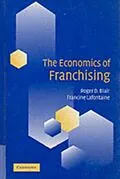This 2005 book describes in much detail both how and why franchising works. It also analyses the economic tensions that contribute to conflict in the franchisor-franchisee relationship. The treatment includes a great deal of empirical evidence on franchising, its importance in various segments of the economy, the terms of franchise contracts and what we know about how all these have evolved over time, especially in the US market. A good many myths are dispelled in the process. The economic analysis of the franchisor-franchisee relationship begins with the observation that for franchisors, franchising is a contractual alternative to vertical integration. Subsequently, the tensions that arise between a franchisor and its franchisees, who in fact are owners of independent businesses, are examined in turn. In particular the authors discuss issues related to product quality control, tying arrangements, pricing, location and territories, advertising, and termination and renewals.
Zusammenfassung
This 2005 book describes in much detail both how and why franchising works.
